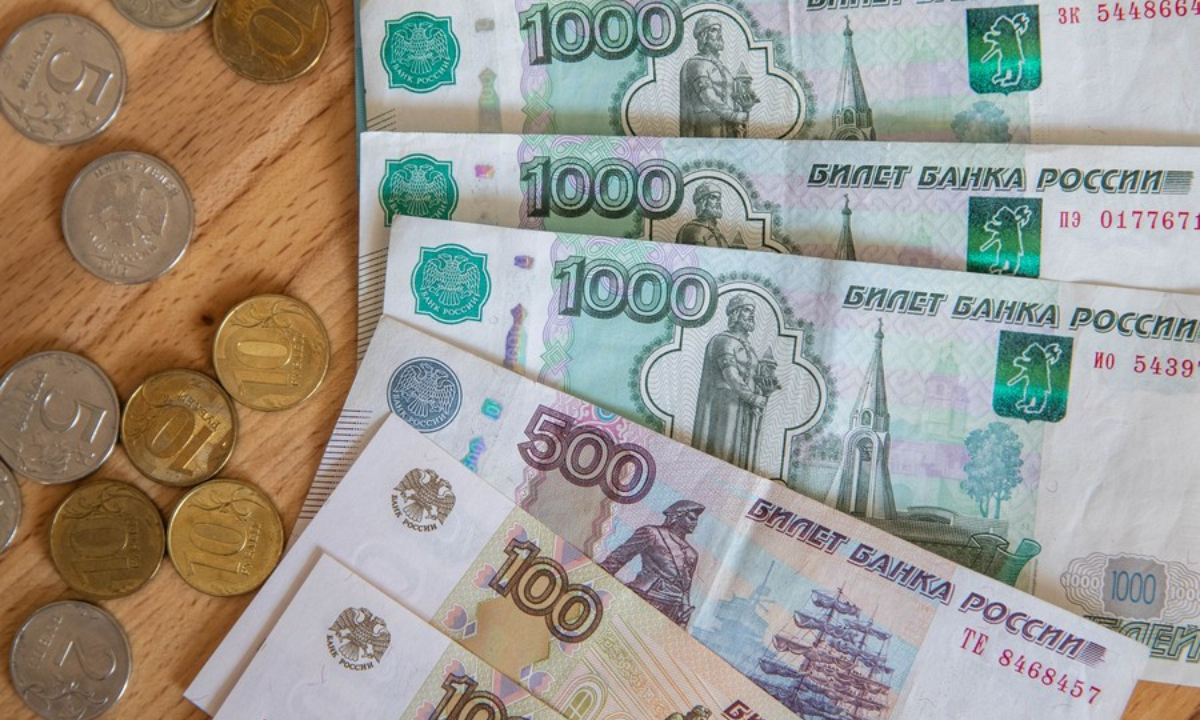
Photo taken on March 24, 2022 shows ruble banknotes and coins in Moscow, capital of Russia. Photo:Xinhua
Russia may use a digital currency in cross-border settlements with China amid an accelerated push to develop the digital ruble, as a move to reduce the US' global financial hegemony, Reuters reported on Monday, citing a senior Russian lawmaker.
"Discussions on digital financial assets, the digital ruble and crypto-currencies are currently intensifying in society, as Western countries are imposing sanctions and creating problems for bank transfers, including in international settlements," according to a Reuters report, citing Anatoly Aksakov, head of the financial committee in Russia's lower house of parliament.
Aksakov said that the digital ruble is the key, because financial flows can bypass systems controlled by "unfriendly countries," noting that the next step for the digital ruble would be to launch it for mutual trade and monetary settlements with China.
"If we launch this, then other countries will begin to actively use it going forward, and America's control over the global financial system will effectively end," said Aksakov.
This digital currency settlement system, which can bypass intermediary currencies, will greatly improve transaction efficiency, while strengthen security and confidentiality, compared with traditional settlements, Wang Peng, a researcher at the Beijing Academy of Social Sciences, told the Global Times on Tuesday.
China is well-prepared for using the digital yuan in international settlements, and once the Russian digital currency system is fully developed and commercialized, their bilateral digital transactions will be "just a matter of time", Chen Jia, an independent international strategy research fellow, told the Global Times on Tuesday.
Chinese authorities are expanding the use of the digital yuan. A senior official of China's central bank said last week that it will expand the use region for the digital yuan from the first four trial cities - Shenzhen in South China's Guangdong Province, Suzhou in East China's Jiangsu Province, Xiongan New Area in North China's Hebei Province and Chengdu in Southwest China's Sichuan Province - to province-wide testing.
Russia will start a pilot project using its digital ruble with real customers and real transactions from April 2023, according to its central bank, adding that the project would run ahead of the initial schedule, Reuters reported in May.
As the two countries have already used each other's currencies in some trade settlements, the prospect for using digital currencies is promising, Chen said.
In early September, China and Russia reportedly signed an agreement to switch trade payments for gas supplies to China to the yuan and the ruble based on a 50-50 split, instead of the dollar, paving the way for strengthened energy and financial cooperation.
But Wang said that at the operational level, detailed rules are to be worked out by the two nations' financial regulators and information departments, to make the mechanism "achievable".
Wang said digital currency trading may start in some point-to-point scenarios between China and Russia, given their complementary economic structures and promising trade prospects.
Bilateral trade rose 31.4 percent year-on-year to $117.2 billion from January to August this year. China's imports from Russia came in at $72.95 billion, up 50.7 percent, customs data showed on September 7.
Bilateral trade is maintaining strong growth momentum, and the two sides will continue to promote normal economic and trade exchanges and maintain stability of industrial and supply chains, Shu Jueting, a Ministry of Commerce spokesperson, said on August 25.
The two countries will work together to foster new growth engines, such as the digital economy, green development and biomedicine, Shu noted.
And, any expansion of the new digital settlement to more countries may take longer time, observers said. "If the digital currency settlement system is to be fully internationalized, it will not only require the newly added countries to 'de-dollarize' their trade settlements, but will also require the third parties involved to give up settlement in dollars. It would be very difficult," Chen said.
But given that more countries are suffering from US dollar hegemony and falling into economic stagnation while the US Federal Reserve aggressively raise interest rates, de-dollarization should be a global trend, Chen said.




